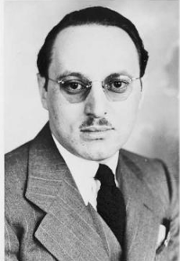
In 1941, New Jersey pacifist Theodore Kaufman self-published Germany Must Perish!, a 104-page booklet advocating the sterilization of the German people and the distribution of their lands. Kaufman was almost a complete nonentity — few shared his views, and the book received few sales or notices. But it made him a giant in Germany, where it became a mainstay of nationalist propaganda, stoking the very fires that Kaufman had hoped to extinguish.
In his diary on Aug. 3, 1941, Joseph Goebbels wrote, “He really could not have done it better and more advantageously for us if he had written the book to order. I will have this book distributed in millions of copies in Germany, above all on the front, and will write a preface and afterword myself. It will be most instructive for every German man and for every German woman to see what would happen to the German people if, as in November 1918, a sign of weakness were given.”
Hitler approved, and soon the propaganda ministry had produced a brochure presenting and commenting on Kaufman’s book. “Above all,” Goebbels wrote, “this brochure will finally and definitively do away with the last remnants of a still-existing softness. In reading this brochure, even the stupidest idiot can figure out what threatens us if we become weak.”
American journalist Howard K. Smith witnessed these effects firsthand in Germany. “No man has ever done so irresponsible a disservice to the cause his nation is fighting and suffering for than [Theodore] Kaufmann,” he wrote. “His half-baked brochure provided the Nazis with one of the best light artillery pieces they have, for, used as the Nazis used it, it served to bolster up that terror which forces Germans who dislike the Nazis to support, fight and die to keep Nazism alive.”
Kaufman protested, weakly, that German anti-Semitism had existed long before his book appeared. But the boost to propaganda was undeniable. “Few Americans have ever heard of a prominent fellow-citizen named Kaufmann,” wrote The Nation in November 1942. “In Germany every child has known of him for a long time. Germans are so well informed about Mr. Kaufmann that the mere mention of his name recalls what he stands for. In one of his recent articles Dr. Goebbels wrote, ‘Thanks to the Jew Kaufmann, we Germans know only too well what to expect in case of defeat.'”
